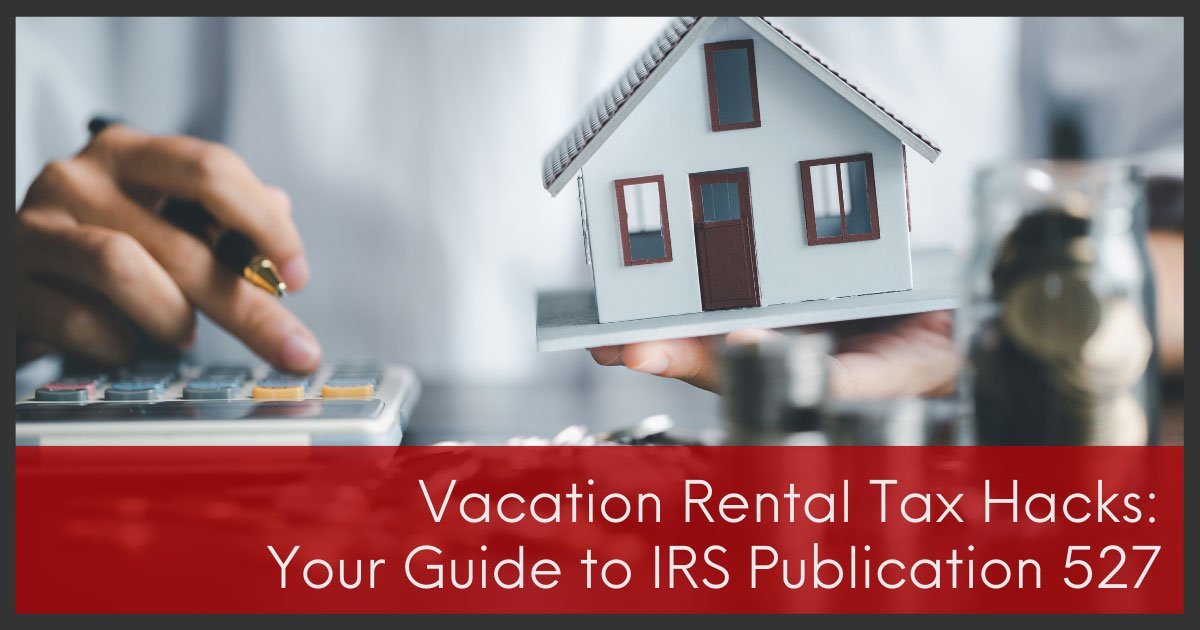Maximize Vacation Rental Profits with IRS Publication 527
Posted by Gary Ashton on Tuesday, June 27th, 2023 at 11:55am.

While owning a vacation rental can be a lucrative investment, it's essential to understand the tax implications that come with it. Fortunately, the Internal Revenue Service (IRS) provides valuable information on properly reporting rental income and expenses in Publication 527. By following these guidelines, property owners can maximize their profits and optimize their taxes.
One of the first things property owners must understand is whether their property qualifies as a personal residence or a rental property. This distinction affects how expenses are deducted and which deductions are available. Additionally, Publication 527 outlines which vacation rental expenses are tax deductible, including mortgage interest, property taxes, insurance premiums, maintenance costs, and more. Understanding these deductions can help owners save money on their tax bills and increase their bottom line.
What Is IRS Publication 527?
IRS Publication 527 provides tax information for those who own residential properties rented out for income. It covers important topics such as property depreciation, deductions on rental income, and renting only part of a property.
One key area covered in Publication 527 is rental income regarding standard and advance rent payments, lease cancellation payments, and tenant expenses. Advance rent is when rent is paid before the period it covers, while a lease break or security deposit forfeiture is considered rental income for the year received. There are also special rules for those who rent their residence for less than 14 days during the year.
Another vital aspect detailed in IRS Publication 527 is deductions from rental income. These include home mortgage interest, insurance premiums, real estate taxes, depreciation, and other nondeductible personal expenses. Property owners who self-manage their rental properties may be able to deduct tax losses depending on their circumstances. However, renting out a second home usually falls under passive activity, which doesn't allow for tax loss deduction.
By consulting this resource before renting out your dwelling or second property, you can avoid costly mistakes and maximize your profits over time.
Personal Residence vs. Rental Property

Understanding whether your vacation home should classify as a personal residence or rental property can help maximize profits by allowing proper reporting of income and deductions related to its use. A personal residence is a property used to live in and use for personal purposes. On the other hand, a rental property is one in which you rent out to others for income. Classifying your vacation home as either one of these categories is important because they have different tax implications.
If your vacation home is classified as a personal residence, you may be able to deduct mortgage interest and property taxes on Schedule A of Form 1040 but not rental expenses. However, suppose your vacation home meets certain criteria, like being rented out for more than 14 days per year or exceeding 10% of the total days it was rented out during the year (whichever is greater). In that case, it will be classified as a rental property, and deductions for rental expenses are allowed with special rules applied.
When your vacation home classifies as a rental property, IRS Publication 527 provides guidance on reporting income and deductions related to its use. Homeowners must report rental income on Schedule E of Form 1040. If the total expense amount exceeds the rental income earned in any given year, losses may be claimed up to $25,000, subject to some limitations. Keep detailed records, including receipts and invoices for all expenses incurred related to renting out the property, so you can easily make calculations at tax time.
What Vacation Rental Expenses Are Tax Deductible?
To make the most of your profits, you can deduct expenses related to renting out your property, like insurance, maintenance, and cleaning fees. According to IRS Publication 527, property owners can deduct rental expenses from their rental income if they’re ordinary and necessary for managing the rental property.
IRS Publication 527 also outlines other deductible expenses to help vacation rental owners maximize profits, including the following:
- Advertising costs to market the property to potential renters
- Utilities like electricity and gas paid by the owner during any period when it was rented out during the year
- Taxes assessed on real estate by state or local governments based on value alone or value plus a fixed amount charged per unit of service provided (like trash collection)
- Home improvements that can boost bookings or appeal, like painting walls or replacing broken windows
Accounting for Depreciation
Vacation property owners must consider the concept of property depreciation, as it can significantly impact their long-term profits. Owners can depreciate their rental properties over time to reduce their tax obligations. Several factors, including the property type, recovery period, and depreciation method used, determine the amount of depreciation. To calculate property depreciation for tax purposes, homeowners must divide their original cost basis by the expected lifetime of the property.
In addition to reducing taxes paid each year through depreciation deductions, vacation rental owners can use this strategy to reinvest in and upgrade their properties over time. Upgrades such as new appliances or furnishings improve guest experiences and increase appeal and demand for rentals overall.
Understanding how to account for depreciation in your vacation rental is crucial for maximizing profits and minimizing expenses over time. By taking advantage of all available deductions outlined in IRS Publication 527 and consulting with experts on how best to structure your investments moving forward, you can ensure successful financial outcomes now and in the future without sacrificing quality guest experiences or personal enjoyment of your second home.
IRS Publication 527: A Valuable Resource for Vacation Rental Owners
Understanding IRS Publication 527 can be a game-changer for vacation rental owners looking to optimize their taxes and increase their profits. By distinguishing between personal and rental use of the property, they can determine which expenses are tax deductible. Moreover, accounting for depreciation is another essential factor. By accurately calculating the depreciation of your vacation rental property, you can reduce your taxable income and ultimately save money on taxes.

Gary Ashton
The Ashton Real Estate Group of RE/MAX Advantage
The #1 RE/MAX team in the World!
